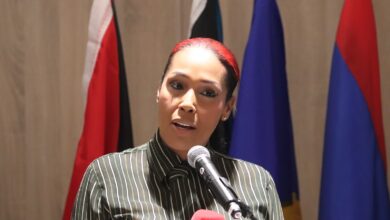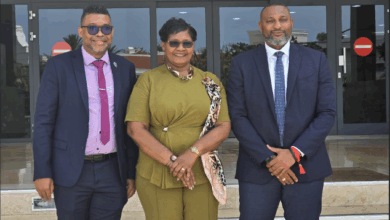It is a pleasure to join in welcoming you to this opening ceremony. which will signal the start of a three-part training programme in Project Development and Project Management being conducted within the Organisational Development (OD) component of the CIDA-funded CARICOM Capacity Development Programme (CCDP).
I am delighted at the interest shown in these workshops; it is obviously an indication that the Secretariat staff realises the importance of the skills you will derive from this training.
Within the overall rubric of capacity building for the Secretariat, the general objective of the OD component of the CCDP is to equip the Secretariat to facilitate the implementation of decisions, and to mobilise and manage its human and financial resources. This training programme is therefore intended to strengthen our capacity to develop and implement projects, as well as to improve our performance with regard to the mobilisation and management of
By the end of this series of training workshops, some 45 staff members of the Secretariat will be better equipped to design, prepare and implement projects. As a result, we anticipate that there will be a higher quality of project documents, an increased number of effective projects prepared, as well as greater effectiveness and efficiency in implementing and monitoring projects. These skills will be critical for the successful implementation of the Secretariat’s work programme.
It is worthy of note that, as the Secretariat set about to elaborate a strategic vision to guide our work, to reflect our priorities and to enable the implementation of our work programme in the context of our Strategic Plan, resource mobilisation and project development and management were identified as areas of priority. Indeed, resource mobilisation and income generation have been accorded priority in the list of the Secretariat’s thematic priorities for 2004.
Why do we need project management skills?
Under Article 24(2c) of the Revised Treaty of Chaguramas Establishing the Caribbean Community, the Secretary-General of CARICOM has been entrusted with the responsibility to “identify and mobilise, as required, external resources to implement decisions at the regional level, and undertake studies and develop decisions on relevant issues into implementable proposals”. Such wide-ranging responsibility with respect to technical cooperation arrangements, assigned to the Secretary-General, also reflects recognition by our Heads of Government of the importance of resource mobilisation.
It should therefore be no surprise that the development of the capacity of the Secretariat to identify, formulate, and implement projects and programmes in an efficient and effective manner, has been emphasised in the CIDA-funded CARICOM Capacity Development Programme.
Just last December, when addressing the inaugural Resource Mobilisation Forum convened by the CARICOM Secretariat, I stated that resource mobilisation must be a critical function in the work of the Secretariat, if we are to be responsive to the mandates set out for us by the Community. This function is even more important at a time when we are operating in an environment of shrinking resources and expanding needs. The need to optimise the use of available resources is therefore integral to our strength and our sustainability.
In order to place the importance of resource mobilisation in perspective, it may be pointed out that in 2001 and 2002 the donor assistance represented 38% of our annual core budget, while in 2003 it was the equivalent of 55% of the core budget.
The mobilisation and acceptance of financial and technical resources from the donor community are based on the principles of cooperation relationships and partnerships. This implies regional ownership of the thematic priorities funded, and that such donor assistance must be consistent with the policies and socio-economic environment of Member States. It also suggests collaboration in addressing problems and issues of common interest, and coordination of development assistance.
Based on these strategic principles, the Secretariat has established cooperation relationships with a wide number of donor partners including CIDA. Cooperation relationships with the donor community have helped the Secretariat to:
1) support the establishment of the CARICOM Single Market and Economy (CSME) and the Caribbean Court of Justice (CCJ); and
2) spearhead the fight against the HIV/AIDS epidemic, (particularly through the EU-funded project, “Strengthening the Institutional Response to HIV/AIDS/STI in the Caribbean”, through CIDA’s Enhanced Support for HIV/AIDS in the Caribbean Programme, and through USAID’s Strategic Support for HIV/AIDS under the Caribbean Regional Programme).
Donor partnerships have also assisted the Secretariat to:
1) promote renewable energy development through the GEF-funded “Caribbean Renewable Energy Development Programme (CREDP)”, designed to remove barriers to renewable energy use in the Caribbean;
2) enhance food security, through the FAO-supported Food Security Project, funded by the Government of Italy;
3) promote more effective disaster management with funding from the Japan-UNDP Trust Fund for Human Security for the project, “Strengthening the Search and Rescue Capability of the Caribbean Disaster Emergency Response Agency (CDERA)”; and
4) forge ahead with the development of capacity to reduce vulnerabilities and risks associated with climate change, through the World Bank-funded “Mainstreaming Adaptation to Climate Change Project”.
I list these important projects to illustrate the importance of donor financing and technical assistance to development programmes in the region, as the Secretariat seeks to support Member States’ efforts to respond to changes in the global economic environment, achieve substantial growth and reduce the level of poverty.
Given such strong support from the donor community in assisting us to meet critical needs and priorities of the Caribbean Community, it is imperative that the Secretariat ensures that:
· The CARICOM/donor partnership is strengthened, especially through proper management of our interface with donors;
· Improved project management is promoted;
· Effective use of donor resources is encouraged;
· Situations whereby resources are lost due to non-use and lack of action cease; and that
· Our project development and management skills are continuously strengthened so that we can access and effectively manage these resources.
I must add that these issues are also of serious concern to the donor community. The donors themselves, I understand, are making efforts to harmonise their own operational policies, procedures and practices in order to improve the effectiveness of development assistance. They have recognised that, over time, the wide variety of donor requirements and procedures for preparing, delivering and monitoring development assistance have generated unproductive transaction costs. Hence, the donors have pledged to undertake reforms, based on best practice and geared towards simplifying and harmonising requirements, and reducing costs, while improving accountability, building capacity, and enhancing concrete development results.
It is recognised and accepted by the donor community that the lack of harmonisation is a great obstacle to development. Harmonisation can serve to increase information sharing, improve practices and procedures, reduce duplication and costs, and enhance coordination among donors.
At the same time, country partners and institutional partners such as the Secretariat are being asked to assume a greater leadership role, take ownership of development results, and ensure greater accountability for resources.
Project development and management are, however, not limited to the use of donor resources. The Secretariat’s as well as other resources can also be effectively managed with the skills derived from the training anticipated in this training programme.
It is against this backdrop that the training programme in Project Development and Project Management was designed and is being implemented.
The knowledge and practical experience will help to ensure the proper design and management of projects and programmes, recognising that, very often, the full objectives of projects and programmes are not achieved, largely because of: ineffective project planning and preparation; defective project design; and inadequate project execution and supervision.
I am gratified that the workshops will place emphasis on practical, “hands-on” project planning and project implementation techniques in order to avoid these pitfalls.
I wish to thank CIDA for providing support under the CARICOM Capacity Development Programme (CCDP), which has made the conduct of this important training programme possible. This training programme and the other initiatives related to resource mobilisation under the OD component of the CCDP, such as the proposed marketing plan and promotional script, and the establishment of a user-friendly project database system, are all aimed at improved use of donor resources, and better project planning and implementation. For the contribution to these additional activities, the Secretariat again acknowledges CIDA’s support.
I am also grateful to the outstanding resource persons and consultants from Caribbean Global Projects Inc., who enjoy the reputation of being among the leading experts in the subject areas that will be explored in the workshops. The Secretariat thanks them for agreeing to be partners with us in this important capacity-building initiative.
I congratulate all those who have been involved in making this training programme a reality and wish you all a most profitable and rewarding experience both personally and professionally.
It gives me great pleasure in declaring this workshop open.
Top





